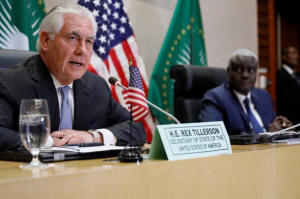|
Tillerson says African countries should
weigh Chinese loans carefully
 Send a link to a friend
Send a link to a friend
 [March 08, 2018]
By Aaron Maasho [March 08, 2018]
By Aaron Maasho
ADDIS ABABA (Reuters) - U.S. Secretary of
State Rex Tillerson said on Thursday that African countries should weigh
Chinese loans carefully, while adding that Washington was not trying to
keep Chinese investment away from the continent.
Tillerson, a former Exxon chief executive, is seeking to bolster
security alliances on a continent increasingly turning to Beijing for
aid and trade.
The top U.S. diplomat may also seek to smooth relations after U.S.
President Trump reportedly dismissed some African nations as "shithole
countries" in January. Trump later denied making the comment.
"We are not in any way attempting to keep Chinese dollars from Africa,"
Tillerson told a news conference in the Ethiopian capital during his
first diplomatic trip to the continent. "(But) it is important that
African countries carefully consider the terms of those agreements and
not forfeit their sovereignty."
Though the United States is the leading donor of humanitarian aid to
Africa, China surpassed the U.S. to become Africa's largest trading
partner in 2009.

Beijing has pumped billions into infrastructure projects, though critics
say there is often little upside for local economies because Chinese
firms and labor build the roads and rails.
Tillerson took that line on Thursday, saying that Chinese investments
"do not bring significant job creation locally" and criticized how
Beijing structures loans to African government.
If a government accepts a Chinese loan and "gets into trouble", he said,
it can "lose control of its own infrastructure or its own resources
through default." He did not give examples.
Russian foreign minister Sergei Lavrov, visiting Zimbabwe on Thursday,
told reporters he did not think it was appropriate for Tillerson to
criticize China’s relationship with African countries.
"It was not appropriate to criticize the relations of his hosts when he
was a guest there with another country," he said.
"OPAQUE CONTRACTS"
Tillerson arrived in Ethiopia, Africa's second most populous nation, on
Wednesday and visited the African Union headquarters on Thursday. The
complex was fully funded and built by China and is seen as a symbol of
Beijing's thrust for influence and access to the continent's natural
resources.
[to top of second column]
|

African Union (AU) Commission Chairman Moussa Faki, of Chad, and
U.S. Secretary of State Rex Tillerson hold a news conference after
their meeting at African Union headquarters in Addis Ababa, Ethiopia
March 8, 2018. REUTERS/Jonathan Ernst

Ethiopia is home to some of Beijing's biggest investments, from a
railway to Djibouti that opened last year to factories and
industrial parks.
His comments followed a speech earlier this week in which he
criticized "China's approach" to Africa which he said encouraged
dependency through "opaque contracts" and "predatory loan
practices".
"We welcome Chinese participation, but we hope they will follow
international rules, international norms and respect the sovereignty
of countries," he said on Thursday.
He made no mention of the political situation in Ethiopia. The prime
minister resigned suddenly last month in what he described as a bid
to smooth reforms. A state of emergency was swiftly imposed but
protests in the restive Oromia region have continued.
Tillerson was due to meet with Ethiopian officials on Thursday
afternoon before flying to tiny Djibouti, host to sprawling military
bases owned by the U.S., China, Japan, France, and Italy.
He will then visit Kenya, a key U.S. ally in the fight against al
Shabaab Islamist militants in Somalia, before traveling to Chad and
Nigeria, which are also battling to contain Islamist insurgents.
Analysts say Trump has focused mainly on security concerns in Africa
at a time when China, Turkey and other nations are ramping up
diplomatic and business links.
(Writing by Maggie Fick; Editing by Matthew Mpoke Bigg)
[© 2018 Thomson Reuters. All rights
reserved.]
Copyright 2018 Reuters. All rights reserved. This material may not be published,
broadcast, rewritten or redistributed.
Thompson Reuters is solely responsible for this content.

 |